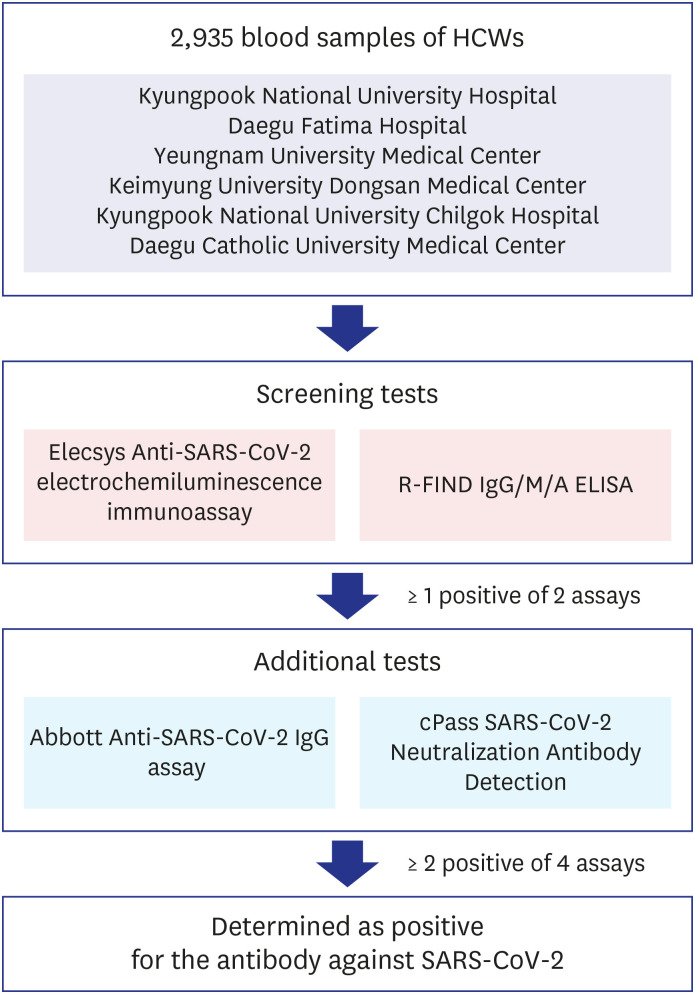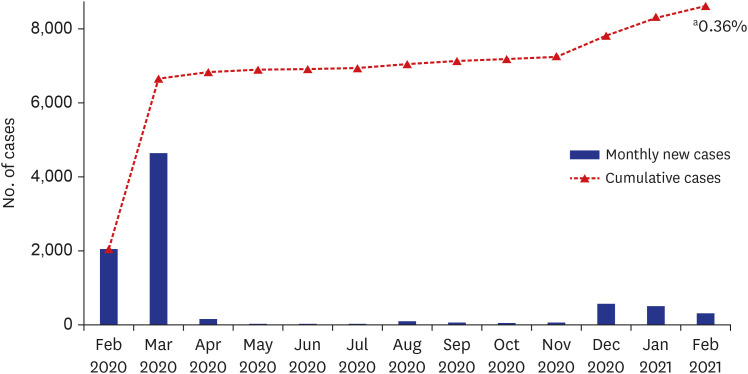J Korean Med Sci.
2021 Nov;36(43):e294. 10.3346/jkms.2021.36.e294.
Prevalence of SARS-CoV-2 Antibody in 2,935 Healthcare Workers at 6 Major Hospitals, Daegu, Korea
- Affiliations
-
- 1Department of Clinical Pathology, School of Medicine, Kyungpook National University, Daegu, Korea
- 2Department of Diagnostic Immunology, Seegene Medical Foundation, Seoul, Korea
- 3Department of Laboratory Medicine, Daegu Fatima Hospital, Daegu, Korea
- 4Department of Laboratory Medicine, Yeungnam University College of Medicine, Daegu, Korea
- 5Department of Laboratory Medicine, Keimyung University School of Medicine, Daegu, Korea
- 6Department of Laboratory Medicine, Daegu Catholic University Hospital, Daegu, Korea
- 7Department of Laboratory Medicine, Kyungpook National University Chilgok Hospital, Daegu, Korea
- KMID: 2522284
- DOI: http://doi.org/10.3346/jkms.2021.36.e294
Abstract
- Background
In Korea, the first community outbreak of coronavirus disease 2019 (COVID-19) occurred in Daegu on February 18, 2020. This study was performed to investigate the prevalence of severe acute respiratory syndrome coronavirus-2 (SARS-CoV-2) antibodies in healthcare workers (HCWs) at 6 major hospitals in Daegu.
Methods
Blood specimens of 2,935 HCWs at 6 major hospitals in Daegu from January 2021 to February 2021 were collected. Every specimen was tested for antibody against SARS-CoV-2 using both Elecsys Anti-SARS-CoV-2 electrochemiluminescence immunoassay (Roche Diagnostics, Rotkreuz, Switzerland) and R-FIND COVID-19 IgG/M/A enzyme-linked immunosorbent assay kit (SG medical Inc., Seoul, Korea) as screening tests. If 1 or more of these screening test results was positive, 2 additional antibody tests were performed using Abbott Anti-SARS-CoV-2 IgG assay (Abbott, Abbott Park, IL, USA) and cPass SARS-CoV-2 Neutralization Antibody Detection Kit (GenScript USA Inc., Piscataway, NJ, USA). If 2 or more of the total 4 test results were positive, it was determined as positive for the antibody against SARS-CoV-2.
Results
According to the criteria of SARS-CoV-2 antibody positivity determination, 12 subjects were determined as positive. The overall positive rate of the SARS-CoV-2 antibody was 0.41% (12/2,935). Of the 12 subjects determined as positive, 7 were diagnosed with COVID-19, and the remaining 5 were nondiagnosed cases of COVID-19.
Conclusion
In early 2021, the overall seroprevalence of SARS-CoV-2 antibody among HCW located in Daegu was 0.41%, and 0.17% excluding COVID-19 confirmed subjects. These results were not particularly high compared with the general public and were much lower than HCWs in other countries.
Figure
Cited by 1 articles
-
GPTZero Performance in Identifying Artificial Intelligence-Generated Medical Texts: A Preliminary Study
Farrokh Habibzadeh
J Korean Med Sci. 2023;38(38):e319. doi: 10.3346/jkms.2023.38.e319.
Reference
-
1. Ministry of Health and Welfare (KR). Coronavirus disease-19, Republic of Korea. Updated 2021. Accessed March 12, 2021. http://ncov.mohw.go.kr.2. Kim SW, Lee KS, Kim K, Lee JJ, Kim JY. Daegu Medical Association. A brief telephone severity scoring system and therapeutic living centers solved acute hospital-bed shortage during the COVID-19 outbreak in Daegu, Korea. J Korean Med Sci. 2020; 35(15):e152. PMID: 32301298.
Article3. Ko JH, Lee JY, Kim HA, Kang SJ, Baek JY, Park SJ, et al. Serologic evaluation of healthcare workers caring for COVID-19 patients in the Republic of Korea. Front Microbiol. 2020; 11:587613. PMID: 33329460.
Article4. Daegu Metropolitan City Hall. Daegu Metropolitan City COVID-19 status. Updated 2021. Accessed July 28, 2021. http://covid19.daegu.go.kr/00937420.html.5. Galanis P, Vraka I, Fragkou D, Bilali A, Kaitelidou D. Seroprevalence of SARS-CoV-2 antibodies and associated factors in healthcare workers: a systematic review and meta-analysis. J Hosp Infect. 2021; 108:120–134. PMID: 33212126.
Article6. Lee SM, Kim IS, Lim S, Lee SJ, Kim WJ, Shin KH, et al. Comparison of serologic response of hospitalized COVID-19 patients using 8 immunoassays. J Korean Med Sci. 2021; 36(9):e64. PMID: 33686810.
Article7. Lisboa Bastos M, Tavaziva G, Abidi SK, Campbell JR, Haraoui LP, Johnston JC, et al. Diagnostic accuracy of serological tests for covid-19: systematic review and meta-analysis. BMJ. 2020; 370:m2516. PMID: 32611558.
Article8. Wajnberg A, Amanat F, Firpo A, Altman DR, Bailey MJ, Mansour M, et al. Robust neutralizing antibodies to SARS-CoV-2 infection persist for months. Science. 2020; 370(6521):1227–1230. PMID: 33115920.
Article9. Song SK, Lee DH, Nam JH, Kim KT, Do JS, Kang DW, et al. IgG seroprevalence of COVID-19 among individuals without a history of the coronavirus disease infection in Daegu, Korea. J Korean Med Sci. 2020; 35(29):e269. PMID: 32715672.
Article10. Marot S, Malet I, Leducq V, Zafilaza K, Sterlin D, Planas D, et al. Rapid decline of neutralizing antibodies against SARS-CoV-2 among infected healthcare workers. Nat Commun. 2021; 12(1):844. PMID: 33558507.
Article
- Full Text Links
- Actions
-
Cited
- CITED
-
- Close
- Share
- Similar articles
-
- Changes in SARS-CoV-2 antibody titers 6 months after the booster dose of BNT162b2 COVID-19 vaccine among health care workers
- Anti-SARS-CoV-2 spike antibody response to the third dose of BNT162b2 mRNA COVID-19 vaccine and associated factors in Japanese hemodialysis patients
- Evaluation of Seroprevalence of SARS-CoV-2 IgG in Healthcare Workers in a Tertiary Hospital in Seoul
- Positivity of SARS-CoV-2 Antibodies among Korean Healthy Healthcare Workers 1 and 2 Weeks after Second Dose of Pfizer-BioNTech Vaccination
- Body Weight is Inversely Associated with Anti-SARS-CoV-2 Antibody Levels after BNT162b2 mRNA Vaccination in Young and Middle Aged Adults



